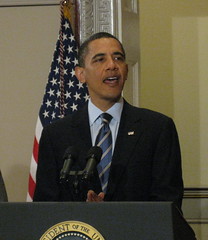FHFA Director Defends Big Bonuses To Fannie And Freddie Execs
By Janie Amaya
Federal Housing and Finance Agency (FHFA) Acting Dirctor Edward DeMarco responded to questions from members of the Senate Banking, Housing and Urban Affairs Committee today over why the agency has paid out $13 million in bonuses to the top 10 executives at twin mortgage giants Fannie Mae and Freddie Mac.
DeMarco defended the boneses, saying FHFA must take such necessary actions to put the regulated entity in a sound and solvent condition in order for it to operate in a safe and sound manner.
“I certainly think we have an entire competitive marketplace in the financial industry that suggests that compensation is an important factor in attracting and retaining high quality talent,” DeMarco said.
On Sept. 8, 2008, FHFA took conservatorship of Fannie Mae and Freddie Mac when the housing crisis began, and has since been working to help both companies regain footing.
“In our time as conservator, we’ve had quite a number of senior executives depart both companies and it has not always been easy to fill these positions with people from the outside,” DeMarco said. He added that often times compensation and the uncertain future of the companies are cited as key reasons for candidates to turn down offers.
DeMarco said that through the Emergency Economic Stabilization Act of 2008, the FHFA must also implement a plan that seeks to maximize assistance for homeowners and use its authority to encourage the taxpayers to take advantage of available programs to minimize foreclosures helping the companies succeed.
However, with no improvement in these companies, some committee members argued that the continuing failure is Congress’ fault.
According to top Republican Richard Shelby (R-Ala.), Fannie and Freddie have already requested an additional $14 billion for last quarter’s loses.
“If Congress had acted, taxpayers would not be subsidizing the pay of Fannie and Freddie executives,” Shelby said.
Currently, the FHFA has established a new set of standards for mortgage servicers.
“We try to simplify the process and to provide very uniform guidance to mortgage servicers on what to do the next day after a mortgage payment is missed, DeMarco said.
 Fannie Mae,
Fannie Mae,  freddie mac,
freddie mac,  housing crisis,
housing crisis,  senate in
senate in  Congress
Congress 






Bipartisan Commission Tasked With Shaping Housing Recovery
By Adrianna McGinley
The Bipartisan Policy Center introduced a new Housing Commission led by former Cabinet members and senators that has been tasked with giving lawmakers policy suggestions for long-term housing wellness.
Former U.S. Senators Kit Bond, George Mitchell, and Mel Martinez; and Henry Cisneros, former HUD Secretary under President Clinton, will serve as co-chairs of the commission that was touted as an idea generator to solve the lingering housing issues plaguing the country.
Mitchell jokingly said the bipartisan commission “does not have the luxury” of proposing solutions that will not be able to pass in Congress. Instead, Mitchell said he had high hopes that his new team will be able to “assist those in office by demonstrating that it’s possible to come up with a meaningful, practical solution that is deliberately bipartisan in nature.”
One notion that members of the commission came to consensus on was that the revival of the housing market and job creation are linked and should both be considered when designing a path to recovery.
“I don’t think you can have a meaningful jobs recovery without improvement in the housing sector and I think the reverse is true as well,” Mitchell said.
Cisneros in addition emphasized the importance of addressing homelessness when debating housing policy.
“It’s an example of where we can’t allow other things to be eliminated because they involve real people and real pain,” Cisneros said.
He also acknowledged the role immigration reform could play in boosting the housing market saying he believes immigrant populations will provide the spark the housing market is looking for.
“I suspect that one of the really big surges in the market for housing going forward is going to be the immigrant population,” Cisneros said. “We’re blessed in this country to have that rich infusion of workers and talent and many of them completely believe in the American dream, their definition of the American dream is home ownership.”